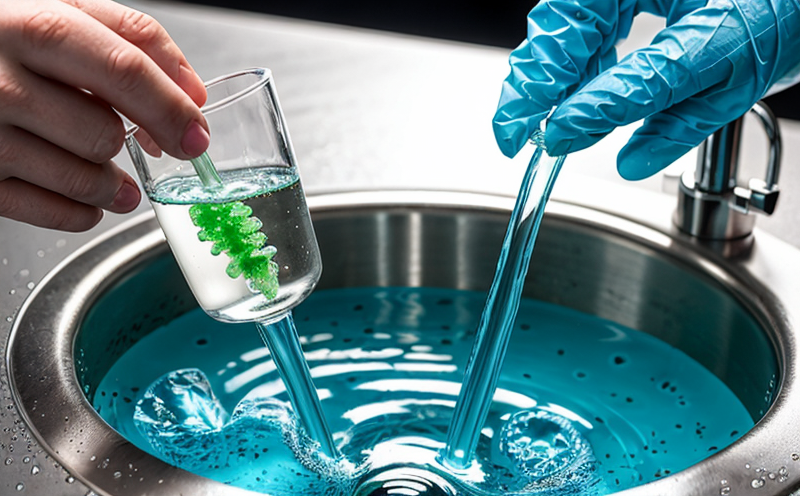ISO 14189 Enterococci MPN Test in Water
The ISO 14189 Enterococci Most Probable Number (MPN) test is a standardized method for assessing the presence and concentration of fecal contamination in water samples. This quantitative microbiological analysis is critical for ensuring water safety, particularly for drinking water sources and wastewater treatment processes.
Fecal coliforms and enterococci are widely used as indicators of faecal pollution because their presence suggests that pathogenic microorganisms may also be present. The ISO 14189 method specifically targets Enterococcus spp., a group of Gram-positive bacteria that can survive in the environment for extended periods, making them reliable indicators.
The test involves serial dilution and incubation procedures to determine the number of enterococci per milliliter (mL) or liter (L) of water. This approach ensures accurate quantification without requiring a single positive culture from every sample. The method is compliant with ISO 14189:2016, which outlines the technical requirements for proficiency testing.
The procedure typically includes:
- Sampling and preservation
- Serum tube enrichment using buffered peptone water (BPW) or other suitable media
- Serial dilution of enriched samples
- Incubation at 35°C ± 1°C for 24 hours ± 2 hours
- Confirmation test on triple sugar iron agar (TSI) slants
The Enterococcus MPN test is essential in regulatory compliance, public health protection, and environmental monitoring. It helps water utilities meet stringent microbial standards set by organizations like the World Health Organization (WHO), United States Environmental Protection Agency (US EPA), and European Union regulations.
Our laboratory adheres strictly to ISO 14189:2016 guidelines to ensure accurate results that are reliable and repeatable. We use state-of-the-art equipment, including automated MPN calculators, to streamline the process and minimize human error. Our expert team of microbiologists ensures meticulous sample handling and analysis.
By choosing this test, you can gain confidence in your water quality data and meet stringent regulatory requirements. This method is particularly useful for:
- Detecting fecal contamination in drinking water supplies
- Evaluating the effectiveness of wastewater treatment processes
- Monitoring surface waters for compliance with environmental standards
- Supporting public health initiatives by identifying potential sources of pathogens
The ISO 14189 Enterococci MPN test is a cornerstone in microbiological water testing, providing reliable data that informs critical decisions in the water sector.
Industry Applications
The ISO 14189 Enterococci MPN test finds extensive application across various sectors:
- Drinking Water Utilities: Ensuring compliance with microbial standards and detecting potential contamination sources.
- Wastewater Treatment Facilities: Monitoring treatment efficiency and preventing discharge of untreated sewage into the environment.
- Environmental Agencies: Supporting environmental impact assessments and public health programs.
- Agricultural Irrigation Systems: Preventing contamination of crops and soil from contaminated water sources.
- Healthcare Facilities: Ensuring safe potable water for patients and staff.
- Cruise Ships and Boats: Maintaining water quality for onboard consumption and sanitation systems.
- Residential and Commercial Properties: Providing peace of mind to property owners regarding the safety of their drinking water supplies.
In each application, the Enterococcus MPN test plays a pivotal role in maintaining public health, environmental protection, and regulatory compliance. Our laboratory offers comprehensive support for all these sectors, providing accurate and reliable results that are essential for informed decision-making.
International Acceptance and Recognition
The ISO 14189 Enterococci MPN test is widely recognized and accepted internationally due to its robust methodology and standardization. This method aligns with global standards such as:
- ISO 14189:2016
- AWS A5.3-2017 (American Water Works Association)
- NSTL 3101.1-2017 (National Standardization Technical Committee of China)
- APHA [1] (Association of Public Health Laboratories)
The test is recommended by regulatory bodies like the US EPA and WHO, ensuring its relevance in diverse environments. Its acceptance across multiple regions underscores its reliability as a tool for microbiological water testing.
Our laboratory's proficiency in this method guarantees that our results are recognized worldwide, providing clients with consistent and trusted data regardless of location or jurisdiction.





